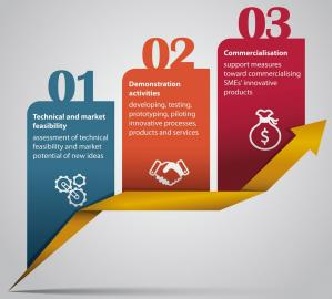 newsitems
newsitems  EU-CoE South Med. Program 2015-2017 kicks off in quest of New Tools for Democratic Stability
EU-CoE South Med. Program 2015-2017 kicks off in quest of New Tools for Democratic Stability
EU-CoE South Med. Program 2015-2017 kicks off in quest of New Tools for Democratic Stability
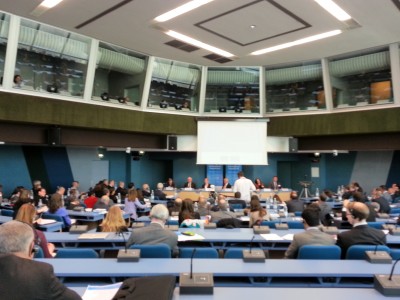
*Strasbourg/CoE/Angelo Marcopolo/- The Quest of New Tools for Democratic Stability in South Mediterranean marked the overall ambiance of EU/CoE's Conference which kicked off in Strasbourg the South II joint Program for the period of 2015-2017, in the presence of CoE's Secretary General, Thornbjorn Jagland, who stressed from the outset the importance it has Today to help "spread Europe's Values well beyond the continent", and particularly at its immediately Neighbouring Countries, when "facing" ISIL's Deadly Terrorists and other "growing extremism and anti-democratic forces" has become an urgent, vital need, where CoE's impressive institutional armature on Democracy and "against Human Traffickig, Corruption and Terrorism" can expand "a Common Legal Space" with Europe's Historic Neighbours.
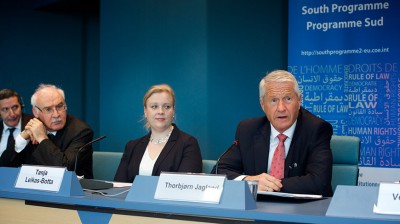
- Speaking later to "EuroFora", the experienced Director of the PanEuropean Organization's Constitutional Law watchdog, known as "Venice Commission", Thomas Markert, observed from the outset that the Special Status of "Partner for Democracy", already attributed by CoE's Parliamentary Assembly to Morocco and Tunisia, might, indeed, be a useful instrument to spread wider in that area in the Future, but also warned of the currently obvious fact that, at least as things stand now, something similar doesn't yet seem possible f.ex. for Libya, while even in Jordany it might prove to be quite Difficult to realise soon enough, so that Progress should better be made Today through other EU/CoE's tools.
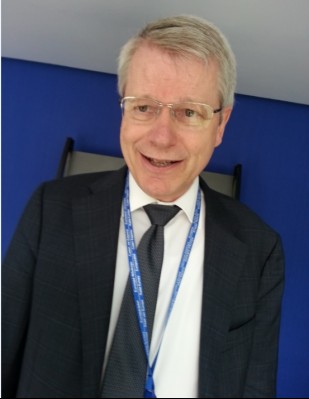
----------------------------------------
- But it was mainly from the Southern Coast of the Mediterranean that came a First Call for a "New Tool" to boost the Euro-Mediterranean policy, after Barcelona's EuroMed. Program focused on Culture, and EU's Union for the Mediterranean's focus on Economy, apparently seeking a New Horizon, while others denouned the fact that, in substance, "20 Years were lost" in EU - South Mediterranean relations, as they criticaly said...
- The 1st vice-President of the Parliament of Morocco, Mohamed Yatim, at the Concluding Session of EU/CoE's Conference, suggested the Idea for those Southern Mediterranean Countries who already have an "Advanced Expertise" in CoE's Legal and Political instruments, to go Further Ahead in a way which "could ensure Success of Other Countries too", as he said.
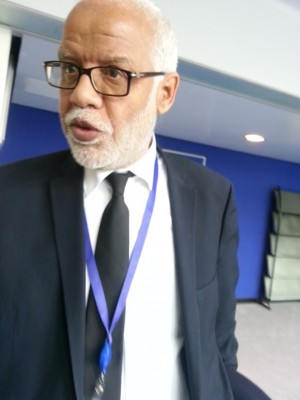
+Speaking later to "EuroFora", vice-President Yatim explained, f.ex., that, in his view, it would be Easy for CoE's Assembly, - where Morocco and/or Tunisian MPs can Speak, (as representatives of those Southern Mediterranean Countries which have already become CoE's "Partners for Democracy"), but can't yet Vote, not even, Table a Draft Resolution, neither Amendments, nor become PACE's Rapporteurs, etc, - to give them, progressively, some More Possibilities to Act and react, together with all other PACE's full Members.
-------------------------------
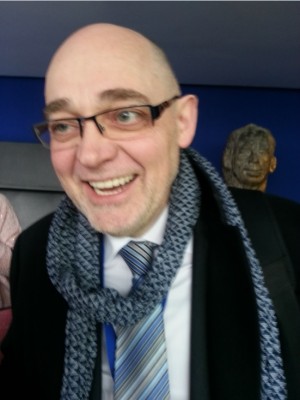
- Meanwhile, the Experienced former President of CoE's International NGO's conference (INGOs), Jean-Marue Heydt, from Strasbourg's Region Alsace, who has recently been Elected as CoE's North-South Center's President, headquartered at Portugal's Lisbon, speaking to "EuroFora", found natural to try to use his acquired know-how in order to facilitate the development of Personal Contacts and "Networks" between the "Civil Societies" of teh Two Shores of the Mediterranean, in relation with EU/CoE's relevant activities.
---------------------------------------
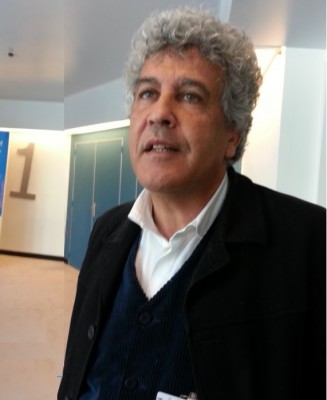
- As for the impressive CoE's Opening Session's Keynote Speaker, Mohammed Tozy, Director of Economics and Governance School of Rabat, and Head of CoE's Political School for Morocco, speaking later to "EuroFora", he advanced, inter alia, also the Idea to develop mutualy desirable contacts and projects, focusing also on cultivating the emergence of several People (Politicians, Officials, Experts, Journalists, Businessmen, etc), who could become both motivated and able to act and cooperate Together for the Common Interest of the Euro-Mediterranean area.
Last, but not least, curiously, the otherwise well-educated President of Tunisia's National Instance for the Fight against Corruption, Samir Annabi, said that we should all be inspired here also by what he called "the German word "Praxis"" (sic !), and, unfortunately, the otherwise efficient Moderator from Deutsche Welle Akademy, Patrick Leusch, didn't rectify at all, on the contrary almost repeating Annabi's Terminologic inaccuracy... It's a pitty, because, in fact the Word "Praxis" notoriously comes from Ancient Greek language, (stemming, in particular frrom the Verb : "Pratw", which means "I do" or "act"). It's true that German Scientists have, many times, Saved several parts of Ancient Greek Civilisation, often by renovating and/or completing them, as f.ex. with the Wonderful Work done by German Jurists in Medieval times on the "Pandekten-Recht", which stems from Legal Rules Codified by Byzance's Emperor Justinian since the 6th Century AC, etc. But it's, on the contrary, Unwise to make as if the Greek Language of Ancient Times didn't even exist Today : Regardless of whatever Errors some Contemporary Politicians in Greece might have committed on Financial policies, the Ancient Greek Civilisation doesn't belong to them, but to the Cultural Heritage of Europe, or even of the World. Particularly when it comes to the ...Mediterranean Sea's Countries, where the Ancient Greek Language notoriously used to be "Ligua Franca" for more than a Thousand Years, during which it was practiced by various People in everyday "Praxis"....
------------------------------
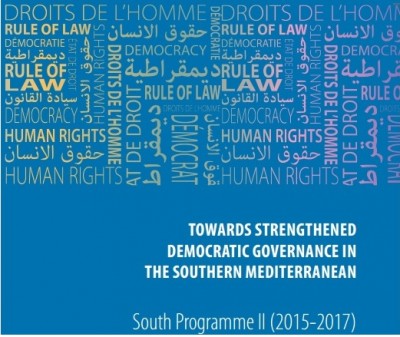
The 2015 South II program launching Conference was attended also by the new Deputy Head of EU's Delegation to the CoE, Tanja Leikas-Botta, and various Representatives (Politicians, Scientists, Judges, Heads of Independent Authorities, etc) from Algeria, Egypt, Jordan, Israel, Lebanon, Morocco, the Palestinian Authority, Tunisia, etc, as well as an impressibe tableau of CoE's Officials from manifold bodies experienced on Democracy, Human Rights and Rule of law issues, such as, f.ex., the Parliamentary Assembly, the Congress of Local and Regional Authorities of Europe, ECHR, the "Venice Commission" on Democracy through (mainly Constitutional) Law, the Lisbon-based "North-South Center, the World Forum for Democracy, the Neighborhood Division, the Treaty Office and the Legal Cooperation Department,, the Action against Crime Department, "Group Pompidou" to Combat Drug abuse and Illicit Trafficking of Drugs, Economic Crime Unit, the Division for Independence and Efficiency of Justice and the CEPEJ, etc, under the guidance of Verena Taylor, Director General of Programs.
While Pilar Morales, Head of COE's Neighborhood Division was reading out for Discussion a Draft paper on the Conclusions of the 2015 South II Conference, it was anounced by the CoE that, already, a First Group of specialists from South Mediterranean Countries was due to come to Strasbourg Next Week in order to get familiar to ECHR's functioning and related matters.
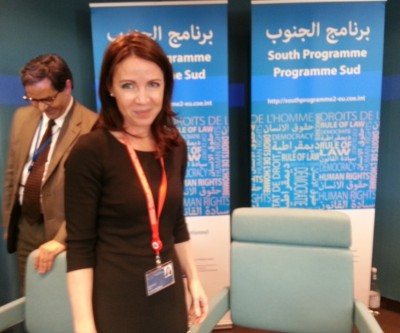
(../..)
------------------------
***
("Draftnews", as already send to "EuroFora"s Subscribers/Donors, earlier. A more accurate, full Final Version might be published asap).
***
Main Menu
Home Press Deontology/Ethics 2009 Innovation Year EU endorses EuroFora's idea Multi-Lingual FORUM Subscribers/Donors FAQs Advanced search EuroFora supports Seabird newsitems In Brief European Headquarters' MAPs CoE Journalists Protection PlatformBRIEF NEWS
- 00:00 - 02.06.2021
- 00:00 - 18.10.2020
- 00:00 - 19.06.2020
- 00:00 - 18.05.2020
- 00:00 - 20.04.2020
- 00:00 - 02.02.2020
- 00:00 - 09.12.2019
- 00:00 - 27.11.2019
- 00:00 - 16.11.2019
Popular
- Yes, we could have prevented Ferguson riots says World Democracy Forum's Young American NGO to ERFRA
- Spanish People Elect CenterRIGHT Majority with 1st Party and Total of 178 MPs (6 More than the Left)
- Pflimlin's vision
- The European Athletic "Dream Team", after Barcelona 2010 Sport Championship Results
- Source Conseil d'Europe à ERFRA: Debatre Liberté d'Opposants à Loi livrant Mariage+Enfants à Homos ?
- Head of BioEthics InterGroup, MEP Peter Liese : "Embryonic stem cell research reaching its END" !?
- Spain: Jailed Turkish Terror suspect with Explosive,Drones,Chechen accomplices stirs Merah+ Burgas ?
- UN Head Ban Ki Moon at CoE World Democracy Forum : - "Listen to the People !"
Latest News
- Test Photos (f.ex.+ Invit to EU + Korea Peace meeting)
- EUOmbudsmen Conference 2022: Digital Gaps affect People's Trust threaten EF Project on EU Future ?
- French Election : Black Out on Virus, but Obligation for Fake 'Vaccines" Challenged
- Both French Presidential Candidates point at "Humanism" in crucial times...
- France : Zemmour = Outsider may become Game Changer in Presidential + Parliamentary Elections 2022
Statistics
Visitors: 61485811Archive
Login Form
Other Menu
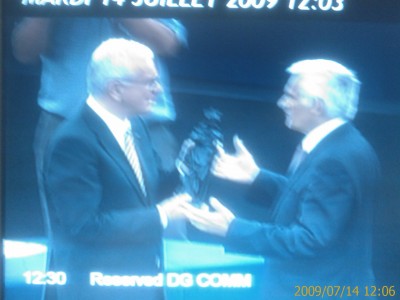
Scientific innovation joined to Faith for Human Rights, Eastern Partnership and fight against the Crisis, but above all, the need to overcome the "Crisis of Trust" from EU Citizens, are the main priorities for new EU Parliament's President, Polish Jerzy Buzek, that a 555-votes-strong majority of MEPs on July 14, Strasbourg made a living symbol of the fact that, 20 years after the fall of Berlin Wall (1989 - 2009) there is no more an Eastern or Western Europe, but only one Europe, as the head of the largest group of MEPs, ChristianDemocrats/EPP, Joseph Daul, stressed after the event.
Speaking later to a group of Strasbourg's Journalists, including "EuroFora", the new EU Parliament's President clarified his stance on concrete topical issues, as f.ex. that of Turkey's controversial EU bid, which was one of the main issues of the June 2009 Electoral campain, clearly won by his party of ChristianDemocrats/EPP : - "At present, Turkey does not fullfil none of EU conditions", he stressed, (See infra).
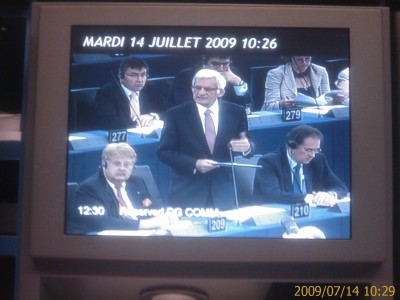
Buzek is well known in Strasbourg and to "EuroFora" as EU Rapporteur for the Framework Program of Scientific Research and Development of Technologies. A Natural Science Professor from the Historic and Religious landmark Polish City of Częstochowa, active in the famous Solidarnosk grass-roots social movement, he served 4 years as Prime Minister (1997-2001), before being elected as MEP in 2004 and 2009, after he brillantly won the latest EU Election at the head of his party (EPP) almost doubling the number of its MEPs from 15 to 28 !
- "Innovation" and "Energy safety", as well as fight against the "Cimat change", but also "Eastern Partnership", the "Mediterranean", "Strategic partnerships" with Russia, the USA, etc, and the search for "solutions to the Economic Crisis" that EU Citizens "expect" from us, will be his "priorities", announced from the outset the new EU Parliament's President, reminding also that the quest for "Human and Civic Rights" played an important role in his experience with the Solidarnosc grass-roots social movement in Poland's History
But, the most important of all, is the urgent need to overcome the "Crisis of Trust" between EU Institutions and the People he stressed : - EU "Citizens often don't understand us", denounced Buzek, launcing a call to "do anything for EU Citizens to understand our work" in EU Parliament : "We (MEPs) need to make EU Citizens involved" in "what we are doing every week, in Strasbourg and Brussels", he proposed. Pointing f.ex. to the hot "Debates" with "strong arguments" exchanged between MEPs during the preparation of their Legislative Decisions, in Committees, delivering often hard struggles between initially opposed points of view, long before forging a majority at the final vote, sometimes more than a year..
Therefore, EU Parliament will be "open to your criticism, for discussion and exchange of views", he promissed to Journalists in Strasbourg.
In this way, Buzek, in fact, highlighted "EuroFora"s main idea, that we strongly advocate since 1997-2007, to systematicaly and actively involve EU Citizens in public debates during the decision-making process of important EU measures, which affect their lives and the society in which they live, (and not only just a few weeks each 4 or 5 Years at the eve of EU Elections)...
--------------------
This is related also to the symbolic gift that Buzek chose to give to the out-going former EU Parliament's President, Hans Gert Poettering, (2007-2009), his collegue in the ChristianDemocrats/EPP, who brillantly won 2009 EU Elections in Germany : A genuine statute of sainte Barbara crafted in Silesia's black Coal by Polish Miners : Those simple but strong people who fought for social change against some technocrats and bureaucrats disguissed into so-called "real-socialists" of old times. (PHOTO).
It's enough to have seen a popular open air mass, at Warsaw's center, with many thousands of people, old and young, simple workers and intellectuals mixed together, with references to Poland's history and struggles for survival and liberty, through various ages, (as fex. that organized at the eve of CoE's 2005 panEuropean Heads of State and Government for the beatification of late Pope John-Paul II), in order to understand what such symbols mean..
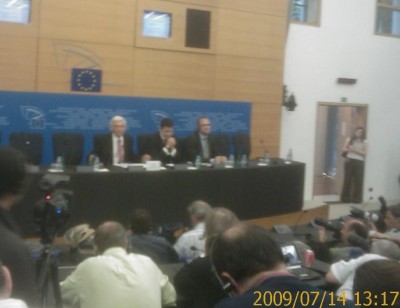
But, overcoming the "Crisis of Trust" with EU Citizens obviously implies also to rectify any errors done in the past, fex. on Turkey's controversial EU bid, with controversial decisions taken in 1999 and 2004 to give a "candidate" status and to start EU negotiations, provoking an unprecedented series of 3 "No" to EuroReferenda and 3 Majoriy Abstentions in EU Parliament Elections : 1999, 2005 and 2009, (even if the latest one succeeded to decelerate and almost stop the drop of participation rates, opening hopes for vote's revival after an electoral campaign clearly critical to Turkey's claims in several mainstream EU countries)
Therefore, Buzek was faced with manifold critical Questions on EU Enlargement, most of them citting concrete examples of certain political problems : But his replies were almost always given as a matter of general principle :
F.ex. Questioned on the suspension of EU - Croatia talks because of a Border conflict with EU Member Slovenia, Buzek prefered to speak about principles :
- "We know that during Enlargement, the process can be blocked by failure to resolve this kind of issues", This concerns also other enlargments' cases", and "these rules are always in force" he warned.
But Buzek avoided to directly reply to a queston on "French and German EPP' calls to define the Borders of Europe", as a German journalist asked him by making a reference to French President Nicolas Sarkozy, and German Chancellor Angie Merkel's, critical statements on Turkey at the June 2009 Electoral campain.
- "Concerning Enlargement, there's always the same rules : There have to be Criteria, which have to be respected if a Country wants to join the EU", he started to simply reply.
- "For my country (Poland) it took us 15 Years to fullfil these Criteria", Buzek reminded, indicating, if proportions are kept, that Turkey, fex. would have to spend some 25 years before eventually joining the EU..
- "Countries wishing to join the EU need to Change their Systems", as we (Poland and other former Eastern European Countries) did, he stressed.
- "'For me, meeting the condition of Human Rights is one of the Key conditions for membership in the EU", preferring again to speak from the point of view of General Principles, on the occasion of an untimely question on Serbia (which is not even a candidate yet)...
- "Turkey" has, "first of all", to fullfil (EU) Copenhagen criteria". Bevause, currently, none of them is fullfiled by Turkey", New EU Parliament's President, denounced, speaking later to a group of Journalists, including "EuroFora".
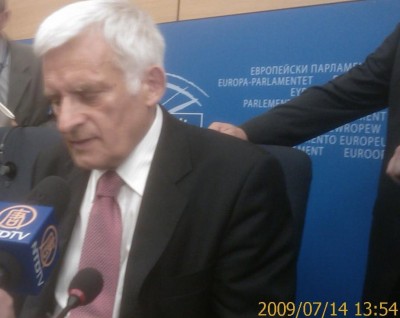
In particular, on Human Rights : - "We (EU) can never forget Human Rights", because "this is at the very Foundations of the EU", Buzek added.
On the contrary, when he referred to EU Enlargment for the "Western Balkans Countries ", Buzek appeared upbeat, finding "promising situations", despite "difficulties" in the Past, since "Countries are queuing to become EU members", and this "generated changes", as he said.
As for Russia, Buzek observed that it was a "very important" country, located "in the same Continent", Europe, "close to our borders", and "we need eachother". "But Russia' has 'differend poblems : "They claim that their system is Democratic, but rules are differend", and we must be "aware of such differencies", fex. "on Human Rights", that we can't ignore, as he said;
Concerning China, where a journalist observed that the recipient of EU Parliament's latest "Sakharov prize" for freedom of thought is "still in prison", Buzek found that since the 1999 events in Tien Amin square, "we see differencies on Human Rights still today", and expressed his "support" for those who try to ameliorate the situation.
On the contrary, speaking recently to "EuroFora" he strongly supported the idea for an EU - Ukraine cooperation, fex. between Airbus and Antonov, in order to build a less costly but more performant than the old and problematic A400M, new Military Transport Airplane : - "They (Ukranian Antonov Company) can certainly do it. I'm sure they can. It's a good Idea, and I'd be glad if it was done", he told us. (See : http://www.eurofora.net/newsflashes/news/airbusantonov.html )













